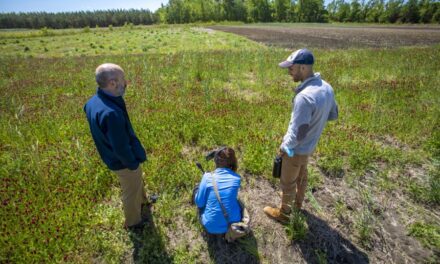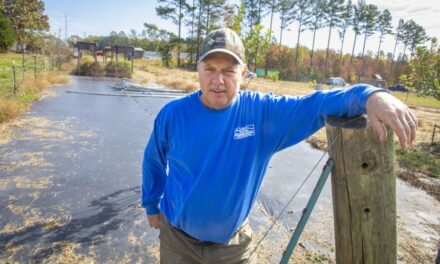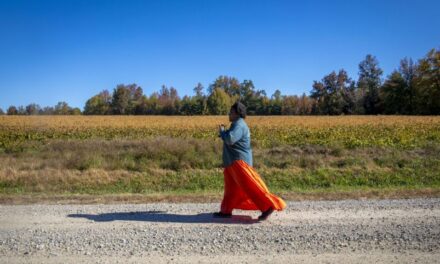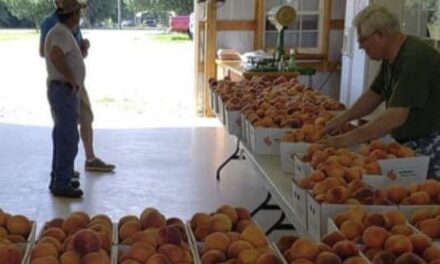Franklin County greenhouse is full of hot air

A wood cabinet holds a blower that connects to the pipes in the McCalla’s geo-air system. Because the pipes suck in air that remains 58 to 67 degrees Fahrenheit no matter what the weather, the McCalla’s greenhouse stays warm in winter and cool in summer.
What does it take for an idea to blossom into something real? Sometimes, the catalyst is as simple as being in the right place at the right time.
Case in point: Steve McCalla, owner of Rocky Ridge Farm, a 30-acre organic fruit, nut and produce farm near Louisburg. McCalla came to North Carolina in 2003 to pursue his dream of living on the land after spending 20 years as a project manager at Swiss Bank in New York City. He met the love of his life, Elke Kaval (now Elke McCalla), and the two of them set up state-of-the-art passive solar greenhouses for raising tomatoes and other vegetables.

Elke McCalla, far right, speaks to visitors at an Open House the McCalla’s held in late fall 2019 at their newly converted geothermal greenhouse. Extension Agriculture and Natural Resources Agent William Landis is at far right.
After a quadruple heart bypass in 2015, McCalla was eager to get back on the land and increase the farm’s productivity. One key challenge was how to keep the greenhouses warm enough in the winter and cool enough in the summer to extend the growing season without increasing heating and cooling costs.
Then he met Extension Agriculture and Natural Resources Agent William Landis at the 2018 Strawberry Festival at the Louisburg Farmers Market – the right person, in the right place at the right time.
“I was looking to get back to selling more after the heart trouble,” recalled McCalla. “I talked to him (Landis) at the Strawberry Festival, and I mentioned retrofitting my greenhouse with a geo-thermal system.” Landis was well-versed on the topic, said McCalla, and most importantly, he told McCalla about a grant program through the Rural Advancement Foundation International (RAFI). The grant provided $9,000 with the recipient providing $1,000 in matching funds through the Agricultural Reinvestment Fund (ARF) grant program, which assists small and disadvantaged farmers in historically tobacco-dependent communities.
“He told us about the grant, helped us meet the deadline and submit it correctly,” said McCalla. “I don’t think we would’ve been able to go this far without him. He was a huge help.”
The results of this chance meeting began to take shape in June and July of 2019. By fall, the McCallas had converted a 40-by-15-foot greenhouse to one of the first geo-air greenhouses in North Carolina. The new system saved them about $1,500 in heating costs during the winter of 2019-2020 and kept their tomatoes and peppers from freezing when nighttime temperatures dipped into the teens.
Never too hot, never too cold
With grant money in hand in June of 2019, the McCallas set out to create their geothermal greenhouse. First, they dug a hole eight feet deep next to the greenhouse with the same 40-by-15-foot dimensions. Next, they brought in 1,500 feet of four-inch high-density polyethylene pipes, strong, flexible pipes often used to transfer fluids or gas. With assistance from Howard Brodie of Brodie Contractors in Louisburg, excavation took about a week. Then, the McCallas began laying the pipes in the excavated hole, surrounding each pipe evenly with soil. A layer of sand placed on top of the soil helped keep the pipes in place and equalized the pressure around them, so the soil wouldn’t crush them. A second layer of pipes, soil and sand was placed in the excavation site before it was covered.
“We did two layers of pipes because the more pipe you have, the more surface area you have and the more cooling you get,” explained McCalla.
One end of plastic pipe was placed at the greenhouse ceiling and the other end at the floor level. A blower in a cabinet connects to the pipe, sucks in air from the underground pipes and blows it into the greenhouse. Because the soil surrounding the pipes is about 67 degrees Fahrenheit in the summer and about 58 degrees Fahrenheit in the winter, the air pushed into the greenhouse warms it on nights that could kill sensitive plants. During the heat of summer, hot air from the greenhouse is sucked into the pipes, cooled under the soil, and then returned to the greenhouse.
“You are literally sucking air from the underground pipes into the greenhouse,” said McCalla. “In the summer, when the air at the roof level is about 130 degrees, you are sucking the hot air down into the pipes, where it is cooled by the soil that never gets too hot or too cold. It’s a continuous loop, like the radiator in your car.”
When the geothermal system was completed in the middle of summer 2019, the McCallas said they felt “a moment of joy” when they turned on the blower and felt cool air streaming into the greenhouse.
Longer seasons and a competitive advantage
Steve McCalla says he paid only $60 in heating costs last winter – the cost of the electricity used to run the blower. He has also added 1,500 hemp plants to the tomatoes, peppers, kale and swiss chard grown in the greenhouse.

A wood cabinet holds a blower that connects to the pipes in the McCalla’s geo-air system. Because the pipes suck in air that remains 58 to 67 degrees Fahrenheit no matter what the weather, the McCalla’s greenhouse stays warm in winter and cool in summer.
“Without the new set up, we wouldn’t be able to have the hemp,” said Elke McCalla. “They would have frozen, and so would’ve the tomatoes and peppers.”
Landis, the Extension agent who serves Franklin and Warren counties, says geo-air heated and cooled greenhouses could be a a game changer for small farmers.
“Extending the growing season is important because it allows farmers to provide fresh produce that is unavailable during certain seasons,” said Landis. “But season extension is cost restrictive for small farmers with limited budgets because it takes a lot of energy to keep a greenhouse warm in the winter. This is an innovative and cost-effective way to extend your growing season without the huge heating costs.”
Since completion of the greenhouse system, the couple has been busy spreading the word about the value of geo-air heating and cooling. They held an open house to show neighbors and customers the new system last fall. They presented two educational workshops at Louisburg College and plan to convert another larger greenhouse on their property to the geo-air system.
“We took on a project and it worked, and that’s wonderful to know,” said Steve McCalla. “The money we save and the extra crops we grow should give us a competitive advantage.”
Extension expertise, he added, helped turn the idea into a workable project.
“I’m really glad I ran into William Landis at the Strawberry Festival,” he said.



